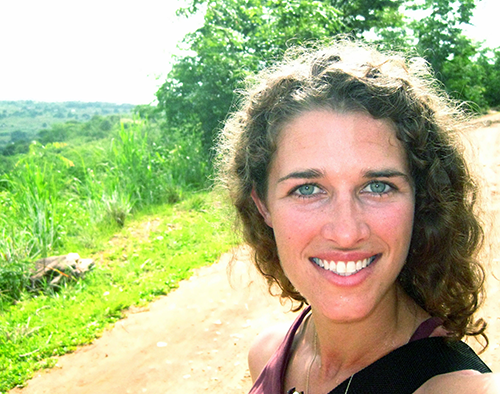Blair (newest NomoGaia team member!) and I are doing follow-up work on Dole’s El Muelle pineapple plantation in Costa Rica. The adventure quotient is low here – the scariest thing we do is drive a rental car. So read below if you want to know about “Monitoring Human Rights Impacts at Dole.”
Dole was kind enough to send senior management to meet us (even the Head of Pineapple Operations for Latin America). The Farm Manager, Environment Manager and HR Manager gave extensive presentations on Dole’s cool initiatives to improve biodiversity (not letting hunters on their property, protecting riparian zones, which create corridors for armadillos and cool spotted cats to sneak around) and be friendly neighbors (buying school supplies for kids, spending tons of money repairing roads their trucks shred in the rainy season). It was all very impressive, except it was stuff they were already doing or planning a year ago. On one slide they boasted that they built a clinic for the incoming population – the clinic is four years old.
In our assessment, our two biggest concerns were that:
(1) a roadside town was inundated with dust from Dole’s trucks, which speed through town and cause such a racket and a mess that the town is almost unlivable. Most people have moved away, but the elderly can’t.
Dole showed us a 24-month timeline for addressing the dust. The first twelve months (2011) involved “determining where dust mitigation is needed.” “Consult locals” doesn’t surface til month 15 (next March). This is silly partly because this timeline is reliant on the idea that a year of planning for community development projects can be done without contacting the community. So there are still risks to health, and there’s still a violation of the Right to Privacy in the two-motorbike town of San Jorge.
(2) the workforce was losing confidence in its labor association in the wake of a theft. Apparently someone stole a $2000 dividend check from the communal funds. The company considered it a small matter (“only $2000”) and the Costa Rican authorities reacted similarly, but this is people’s retirement savings. The scandal was a year old when we asked about it in 2010, and the rumor mill was churning out allegations that the HR manager (who is in charge of layoffs and was also, at the time, in charge of the association treasury, somehow) stole the check, and that workers were being “laid off” for carrying out private investigations of the theft and for being meddlesome.
After 2 years without feedback from the company on the theft incident, the workforce gave up. They started joining a union. The friendly “Solidarity Association” the company was so proud of has lost a third of its membership. Workers say they need a union for job security. I’m usually a fan of unions, but Latin America is a place with such historically challenged relationships between companies and labor unions that the union’s presence is just as likely to shut down the farm (killing 600 jobs) as it is to help them gain worker protections.
To Dole’s credit, they’re not union busting (three cheers for Freedom of Association!), but their approach to reinvigorating the relationship between the workforce and Management is unlikely to be successful. Now, every time they cater to workforce requests, the union takes credit. Because Dole management struggles to express the company’s intentions (and actions) it’s inadvertently invigorating the union it fears, rather than bolstering the association it wishes to preserve. This is the crux of the matter. Dole does almost everything right at the El Muelle plantation, but communicates poorly. They don’t send staffers to be present when they’re repairing school roofs. They don’t follow up with complainants when someone (community member or worker) presents a grievance. They issue general announcements but have no contact person to whom people can ask questions. Rumors abound because people trust people, and Dole strikes them as faceless.

Author: Kendyl Salcito, executive director, NomoGaia
Kendyl Salcito developed her expertise in human rights and business as a foreign reporter in Southeast Asia and North America. She has advised industry groups on corporate human rights performance and contributed to the development of the UN’s Guidance Principles for Human Rights and Business.


